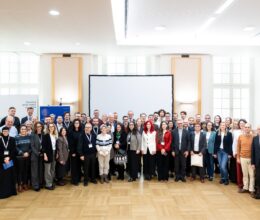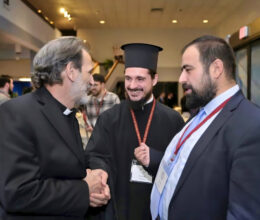
If science were to inexorably separate man from God, there would not be a single religious scientist left in the world. And if that same science were to inexorably drive man towards the fear of God and towards His supreme wisdom, there would not be a single serious scientist who would not pray and weep over the Gospel.
Instead, both in history and in the present, we observe two large groups—thinkers and scientists. One group consists of those who add the salt of faith to the food of knowledge, and the other group consists of those who savor only the sweet dishes. These are the ones for whom God is not needed, neither in their home as a Helper, nor in science as a hypothesis (cf. the dialogue between Laplace and Napoleon).
It is of no consequence which of these two groups holds the majority. In such a case, a few voices more or less will not change the main conclusion, especially since both groups contain a significant number of members. The main conclusion is that science will neither lead us to faith nor bring us into it. Science may help and move you, now to one side, now to the other, but the essence does not lie in that. Within man, there is something other than the mind that analyzes—something where faith itself is conceived and matures.
Blaise Pascal spoke of this when he said that in the heart, there dwells a different logic, distinct from the logic of the rational mind. Pascal, a truly extraordinary figure, spoke of God not as the God of philosophers and scholars, but as the God of Abraham, Isaac, and Jacob.
People like Pascal are precious. These people are necessary, if only to bend the cardboard sword of the atheist-sportsman when he incites his unbelief with the banal jab of the phrase: “science has proven.”

What science? What has it proven? Look, to Pascal, it proved nothing. And not only did it fail to prove anything to him, but Pascal, using mathematical probability, proved the necessity of faith in Christ. If the meaning of life consists in striving for well-being and escaping suffering, and if science is called to ensure or approximate the human ideal of happiness, then, in that case, believing in Christ is both reasonable and necessary, while disbelieving in Him is senseless and dangerous. Judge for yourselves.
Let’s suppose that a man of faith has made a mistake. What has he lost? Nothing. He lived like all other people: he ate, drank, worked, and rested. He simply tried to fulfill the moral law, and for that, he was, quite logically, respected by those around him. Then he died—and that’s it. That is, if he made a mistake. He will decompose into the elements from which he was formed, or, as Omar Khayyam said: “These handfuls of dust beneath our feet were once radiant eyes that captivated us.”
But what if that person is right and has not made a mistake? In that case, he awaits glory, the Kingdom of Heaven, communion with angels, acquaintance with the best people in the world, the vision of Christ, exultation, and peace of soul.
Now, let us look at the irreligious man. What has he gained by living according to his worldview? He did not trouble himself with fasting or attending lengthy services. The sins of the flesh he considered as natural laws. He refused to humble himself before God, and that wasn’t enough for him—he wanted to exalt himself with the proud name of “man.” Yet, he still had to humble himself before his superiors and the circumstances of life. He accomplished no great deeds, but lived according to his pleasures. And in truth, even that pleasure proved fleeting. Illnesses, old age, the gap between his desires and reality, and family conflicts poisoned most of his potential happiness. But despite all his atheism, the man remained stubborn. And now, he has died—to disappear. How surprised he will be when this disappearance eludes him, and the colors of the world become even more radiant! What would he gain by disappearing? Nothing. Not only would he fail to win compared to the man of faith, but even compared to a household pet, he would not win—he might even lose. And here’s why: if he is wrong, his loss could prove so great that he won’t be able to bear it. The defeat will be so immense that he’ll be driven to weep in despair and gnash his teeth. And so it is written: “There will be weeping and gnashing of teeth.”
Thus, of the two options—to believe or not to believe—it is better to believe. You will lose nothing, but the outcome could be spectacular. It is no different from betting on a roulette wheel with millions of gifted tokens. This is the simplest of mathematical calculations.
Conversely, the atheist does not win by becoming food for worms and decay. But when he loses, he loses colossally.
Conclusion: Science will not muscle its way into proving the absence of God. On the contrary, the adherents of godlessness are unfamiliar with the elementary laws of proper reasoning. Therefore, let them no longer appeal to science. In that case, they could say: “I do not believe because the human heart is soulless,” or “vanity consumes,” or “I am afraid to lift my gaze to God.” That would be honest, and it would mean a step closer to future repentance and confession. But as for the phrase “science has proven…” They ought to be ashamed. Aristotle’s logic does not permit contradictions. Don’t apply it where miracles occur. For example, in the realm of the Gospel. There, a Virgin gives birth to a Son and remains a Virgin. There, God becomes incarnate, the dead are raised, and five loaves feed thousands. Clearly, another world has entered this world, and the laws of that other world press upon us, gently pushing aside the immutability of life as we know it. People live their lives, parallel lines never intersect. God is in heaven, we are on earth, and Euclid is right: parallel lines do not meet. Then suddenly, as the page turns, the geometry of Lobachevsky begins. It’s not that the parallel lines have met—God has descended to earth. The two worlds are united, but not merged, and the usual laws of this world start to give way, revealing that “the King who is not of this world” is here, nearby.

Is there such a science that would boldly articulate its thoughts contrary to the visible world?
There is. It is mathematics. It is the queen of sciences. In its hands, once and for all, are all the rational things that cannot be seen. None of us have ever seen, nor will we ever see, the number zero. “Nothing” is unimaginable and elusive. Yet mathematics wields zero with effortless ease, like a housewife with a needle and thread.
We must also mention infinity and how miracles begin. Any mathematician will demonstrate on their fingers that, in infinity, parts of sets are equal to the whole, and that an infinite line is a circle with an infinite radius. Even I could prove that. Therefore, in science, we are already beginning to introduce one of the attributes of God—infinity. At this point, we are already in a position to engage in a conversation in the language of science, one very close to the language of faith. The smiles disappear from the faces of skeptics when the conversation turns to the fact that God has one nature and three Persons. Yes, gentlemen. Aristotle remains outside the door, and we enter the sanctuary of contemplative thought, where no one is surprised by the God-Man, eternal virginity, or the unity of the Trinity. More precisely, they are in awe, but they do not deny it—they contemplate.
So, does science hinder faith? Can one be killed with a kitchen knife? Can walnuts be cracked with a microscope? All of this is possible when life’s vector is not directed in that way. The mind, like a calculator, will obediently calculate the numbers in both righteous and deceptive schemes. The important thing is that the mind be guided by the heart, which (according to Pascal) has its own logic. And most importantly, that heart must be prayerful. Then there will be no fear of anything. Or rather, there will always be something—but the reasons for fear (if we express ourselves mathematically) will tend towards zero.
Excerpt from the book: Archpriest Andrei Tkachev, “Missionary Notes”















